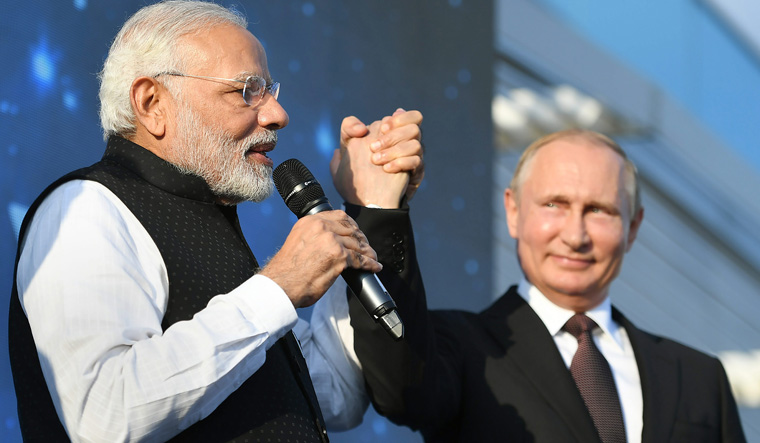Sochi is a resort town on the Black Sea. Among the southernmost destinations in Russia, it has warm beaches and even boasts of palm trees and tea estates. In a country where winters are bleak, a destination this warm and pretty is a jewel. Russia's high and mighty go there annually for vacations; Sochi also forms the perfect backdrop for the personalised brand of diplomatic outreach.
Russian President Vladimir Putin puts his summer break to good use as every year, he invites world leaders for tête-à-têtes, away from the pressure of outcomes, agreements and deals that state visits end up being. In these balmy settings, it is easy to break the ice in frosty relationships and even easier to warm up to nations which matter.
Prime Minister Narendra Modi was invited for a special meet with Putin on May 21, but he isn't the only world leader that Putin hosted this year. There has been a steady stream of world leaders heading to Sochi one after another, for a pleasant talk and a yacht ride on the Black Sea. These include Germany's Angela Merkel, Japan's Shinzo Abe, France's Emmanuel Macron and Syria's Bashar al Assad.
So what made Modi's visit so special? For starters, it was the first time that he had gone on a working visit to Russia. And the backdrop in which he went is rather important. The ministry of external affairs announced Modi's visit a few days prior to departure, which is not out of character. But even before the official announcement of a trip, there is usually a buzz, which was missing this time, indicating the Sochi summit was a sudden plan.
The official statement from the Indian side does not go into the specifics discussed, though it says that the two sides exchanged views on “international and regional issues” and “held deep discussions on major international issues.” The statement also said the two agreed on the importance of a multipolar world order.
All this indicates that the US in general, and, more specifically the repercussions of Donald Trump's pulling out of the Iran nuclear deal, must have been one of the “major international issues” discussed, as the move has far-reaching ramifications. “Iran has become an important player now, with India's heavy involvement in the Chabahar port, and with both India and Russia being stakeholders in the North-South Transport Corridor,'' said former air chief marshal S. Krishnaswamy.
As part of its move against Iran, the US intends to impose sanctions against those countries that still support Tehran's nuclear programme. India imports a lot of oil from Iran. These are not sanctions endorsed by the United Nations, just US-imposed ones, but affected countries will have to work out how to move ahead through this development.
India and Russia have a special and privileged strategic partnership; indeed the Russians are often called India's all-weather friends. But in recent years, as India expanded its diplomatic outreach, there have developed some areas of strain, and even divergence. On the one hand, India has gone shopping for military equipment to other countries, specially the US and France. Russia, on the other hand, has supplied military aircraft to Pakistan, India's main adversary. Moscow cosying up to Beijing has caused New Delhi's brow to be raised. And Russia's outreach to the Taliban has rung alarm bells in India.
Observers feel that both sides must have felt it timely to exchange views, specially in the face of emerging international developments that are likely to pose a challenge to both. “Even with a good friend, it is important to keep up and nurture the relationship. India's growing engagement with the US is most welcome, but it should not be allowed to diminish our long-standing and deep-rooted friendship with Russia. Such protocol-free meetings between our top leaders are important and will further enhance the strong bilateral ties that we have built,'' said former Indian ambassador to Moscow Ajai Malhotra.
Modi and Putin will have several occasions to meet this year, but coincidentally all of them are slotted for the second half of the year. There is the Shanghai Cooperation Organisation meet in Qingdao in June, the BRICS meet in Johannesburg in July, the bilateral summit in New Delhi in October and the G-20 meeting in Argentina in November.
“Meetings convened on the sidelines of multilateral summits are inevitably of rather short duration and do not necessarily lead to much getting done. And at annual summits, there is the entire gamut of cooperation that needs to be painstakingly reviewed in a formal setting. Informal meets, like the one in Sochi, provide an excellent opportunity to discuss and appreciate each other's views on important issues of common concern and secure a meeting of minds on them,” Malhotra added.
Modi is known to build up his diplomacy on personal rapport with leaders who matter—and show the personal snub, too, to those who don't. Before Sochi, he had gone on a similar summit to Wuhan, too, to clear a lot of the bad vibes that developed between China ad India over the past year. With Putin, Modi's ties are rather old; the two first met in 2000. Even as chief minister of Gujarat, Modi had made his first overseas trip to Russia. He went to Russia thrice as CM, at a time when many countries did not grant him visas to visit.
One visible outcome from the Sochi trip was the decision to institute a Strategic Economic Dialogue between NITI Aayog and Russia's ministry of economic development for synergy in trade and investment.
That Indo-Russian ties extend to every sphere will be re-emphasised next month with the arrival of the first consignment of liquefied natural gas under an agreement between Russia's Gazprom and India's Gas Authority of India Limited.


